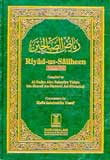Riyad Us-Saliheen (Gardens of the Righteous)

Chapter 316
Desirability of Expiating the Oath taken by a Person who afterwards Breaks it for a better Alternative
1715. `Abdur-Rahman bin Samurah (May Allah be pleased with him) said: The Messenger of Allah (PBUH) said to me, "When you take an oath and consider something else to be better than it, make expiation for your oath and choose the better alternative.''
[Al-Bukhari and Muslim].
Commentary: What we learn from this Hadith is that if a person has taken an oath to do something but subsequently realizes that it is better to forego the oath, he should expiate for the oath rather than sticking to it because it is easier to expiate for the oath than to suffer a loss, be it in religion or otherwise.
1716. Abu Hurairah (May Allah be pleased with him) said: The Messenger of Allah (PBUH) said, "When you swear an oath and consider something else to be better than it, make expiation for your oath and do the thing that is better.''
[Muslim].
1717. Abu Musa (May Allah be pleased with him) said: The Messenger of Allah (PBUH) said, "Verily, I swear by Allah, if Allah wills, I shall not swear to do something but that if I consider something else to be better than it, then I shall make expiation for my oath and adopt the thing that is better.''
[Al-Bukhari and Muslim].
1718. Abu Hurairah (May Allah be pleased with him) said: The Messenger of Allah (PBUH) said, "Persistence in respect of his oath about his family is more sinful with Allah than the payment of its expiation prescribed by Allah.''
[Al-Bukhari and Muslim].
Commentary:
1. "Ahl'' means wife, children and other members of one's family. For example, if a man takes an oath regarding some matter relating to his wife, although the act he has forbidden himself is better for him, it will be sinful to stick to the oath. Far less than this sin would be the breaking of the oath to normalize his relation with his wife and children. The essence of all these Ahadith is that if one comes to realize that, after taking an oath, his oath was wrong, then he must break the oath and do what he had vowed not to do. There are different forms of breaking the oaths. For instance, if one has taken an oath that he will drink alcohol, it will be obligatory for him to break his oath. Or if one takes an oath to not to do a thing which is desirable, or taken an oath to do something which is not desirable, then it will be desirable to break the oath. Similarly, if one takes an oath to not to do something permissible then the act of breaking the oath will also come in the category of permissible.
2. The expiation of an oath is necessary. This can be done by means of feeding ten poor persons, or by providing clothes to a similar number of persons, or by setting a slave free. If one does not have the capacity to do any of the three acts, then he should observe fast for three days..
3. If, in spite of realizing that the act one has vowed not to do is better, one still sticks to his oath, he would be then more sinful.
4. The teachings and practices of the Prophet (PBUH) tell us that to adopt the better course is preferable to sticking to the oath.
